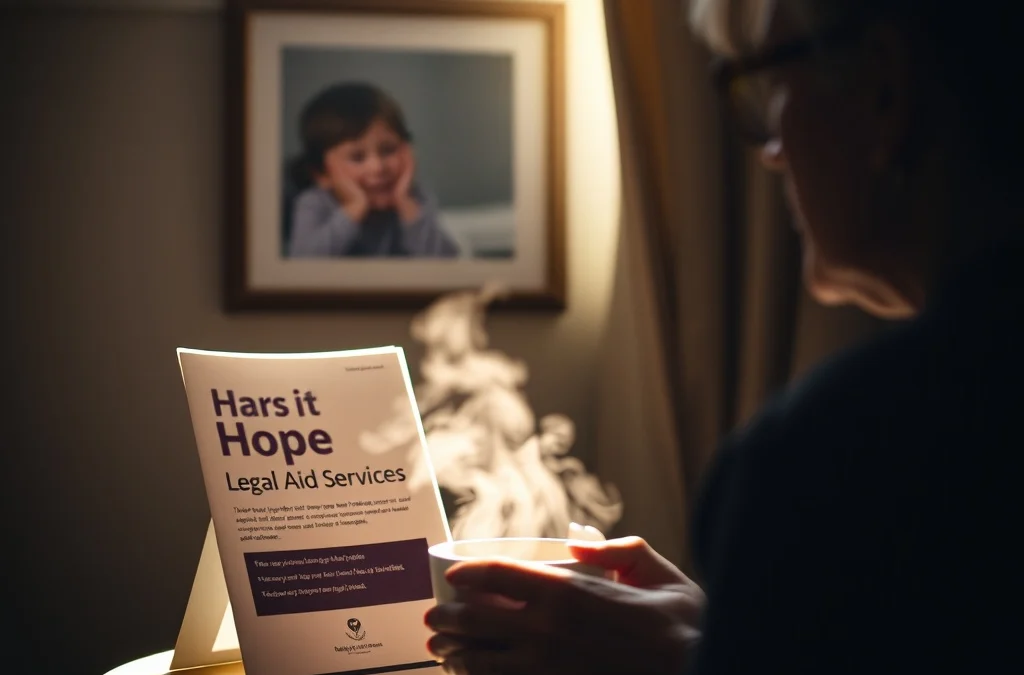What Legal Aid Services Help Domestic Violence Victims in the United Kingdom
If you’re a domestic violence victim in the United Kingdom, understanding the legal aid services available to you is crucial. These services provide vital support, helping you secure protective injunctions and navigate the legal complexities that often accompany such situations. They can guide you through the process of accessing legal aid based on your circumstances and the evidence of abuse. However, many don’t realize the full range of options that exist. What specific services are available, and how do they work to empower victims like you?
Key Takeaways
- Legal aid is essential for domestic violence victims to access protection and support services based on income and evidence of abuse.
- Organizations like Rights of Women and Domestic Violence Assist provide specialized legal advice for survivors.
- Local domestic abuse services can connect victims with trusted solicitors and legal aid advisers.
- The National Centre for Domestic Violence offers a free emergency injunction service to assist victims in urgent situations.
- Online resources and support from Victim Support help victims navigate legal processes and safety planning effectively.
Legal Advice and Representation
When facing domestic violence, it’s crucial to seek legal advice and representation to protect your rights and safety.
Solicitors with expertise in domestic abuse cases can guide you through the legal process. Organizations like Rights of Women and Domestic Violence Assist offer specialized legal advice lines tailored for your situation. Furthermore, many survivors navigate complex court processes without professional support due to the high costs of legal services, making it vital to find accessible resources.
Local domestic abuse services can connect you with experienced solicitors and provide vital support. The National Centre for Domestic Violence (NCDV) offers a free emergency injunction service, ensuring you have immediate protection.
You might also consider Civil Legal Advice (CLA) to understand your eligibility for Legal Aid. Additionally, understanding the division of joint assets is essential post-abuse, as it can significantly affect your financial stability during recovery.
Accessing Legal Aid
Accessing legal aid is a vital step for victims of domestic violence seeking support and protection.
To navigate the application process, it’s essential to consult a solicitor experienced in domestic abuse cases. Here are a few key points to consider:
- Gather evidence and documentation of your financial situation and the domestic abuse.
- Understand that eligibility depends on your income, assets, and supporting evidence of abuse. Legal aid provides essential access for victims to navigate complex legal processes. Additionally, seeking help from FLOWS’ network can connect you with trusted advisers who specialize in supporting survivors.
- Reach out to local domestic abuse services for guidance and referrals.
Support During Prosecution
While navigating the prosecution process for domestic violence, it’s crucial to have support tailored to your needs.
Legal aid services can guide you through this challenging time, ensuring you understand the evidence required for your case. You’ll need documentation like police reports, arrest records, and any protective injunctions, such as non-molestation orders. Additionally, the existence of legal frameworks provides important protections for victims during this process.
Your solicitor will help you gather and submit this evidence, increasing your chances of receiving full funding for court proceedings. In urgent situations, you can apply for protective orders without notifying the abuser, securing your safety. Additionally, legal aid is available for private family law disputes, emphasizing the importance of being a victim of domestic abuse in accessing these services.
Online Legal Support Services
If you’re facing domestic violence, online legal support services can provide immediate help and guidance. These resources are designed to assist you in navigating the complexities of your situation while ensuring your safety and well-being.
-
Confidential advice: Organizations like Victim Support offer emotional support and confidential advice tailored to your needs.
-
Safety planning: Specialist advocacy services can help you create a personalized safety plan and guide you through court processes, including obtaining injunctions and protection orders.
-
Prosecution information: The Crown Prosecution Service’s website offers insights into prosecution procedures and decision-making, helping you understand your options.
These online support services are crucial for empowering you to take the necessary steps to protect yourself and regain control of your life.
You’re not alone in this fight.
Alternative Legal Support Options
Online legal support services provide a solid starting point, but there are alternative legal support options available to further assist victims of domestic violence. These options include independent legal advice, advocacy support, and non-legal services tailored to your needs. It is crucial to understand that domestic abuse can take various forms, which can influence the type of legal support you may require. One key aspect to consider is that advocacy support services, particularly IDVAs, play a vital role in enhancing victim safety and providing essential guidance throughout the legal process.
| Type of Support | Key Features |
|---|---|
| Independent Legal Advice | FLOWS helps navigate court processes and offers expert guidance. |
| Advocacy Support Services | IDVAs provide critical support during the court process. |
| Non-Legal Advocacy | Organizations like WIRE give referrals and information. |
| Community Support Services | Tailored support and accompaniment to court are available. |
Utilizing these services can enhance your chances of securing the legal protection and support you deserve.
Local Support Services
Accessing local support services is crucial for domestic violence victims seeking immediate assistance and long-term recovery. These services offer vital help, ranging from crisis intervention to safe housing. Here are some key resources you can reach out to:
- Next Link: Call 0800 4700 280 for crisis support and temporary housing.
- Julian House: Provides safe housing and the Freedom programme in Bath.
- SARSAS: Contact 0808 801 0456 for support specifically for women and girls. Additionally, many of these services ensure confidential support to protect the privacy of individuals seeking help.
Importance of Evidence in Legal Aid
The importance of evidence in securing legal aid for domestic violence victims can’t be overstated. Strong evidence—like letters from accredited solicitors, police reports, and medical documentation—validates your experience and strengthens your case.
Without sufficient evidence, your legal aid application may be denied, leaving you vulnerable and without support. However, accessing this evidence can be challenging due to costs, data protection issues, and institutional reluctance to assist.
Thankfully, organizations like Rights of Women and the National Centre for Domestic Violence offer crucial guidance in gathering evidence. They can help you navigate the complexities of the legal system and ensure your voice is heard.
Frequently Asked Questions
How Long Does the Legal Aid Application Process Take?
The legal aid application process typically takes up to four weeks, but emergency applications can be processed in 2-3 days. Complexity and information availability can affect these timelines, so be prepared for potential delays.
Can I Access Legal Aid if I’m Not a UK Citizen?
You’d think citizenship matters for legal aid, right? Surprisingly, it doesn’t. If you’re low-income, you can access legal aid regardless of your immigration status. Just meet the means test and prove your case.
What Should I Do if My Legal Aid Is Denied?
If your legal aid’s denied, don’t lose hope. Explore local domestic abuse services for support, seek advice from organizations like Rights of Women, and consider self-representation options to navigate the legal system effectively.
Are There Any Costs Involved in Applying for Legal Aid?
When seeking legal aid, you might wonder if costs are involved. Generally, there aren’t upfront costs, as the aid covers expenses based on your situation. Still, understanding the process ensures you’re prepared and supported.
How Can I Find a Solicitor Experienced in Domestic Violence Cases?
To find a solicitor experienced in domestic violence cases, reach out to local domestic abuse services or organizations like Victim Support. They can refer you to specialists who understand your situation and needs.
Related Articles
5 Tips for Choosing the Right Car Accident Lawyer in the UK
5 Tips for Choosing the Right Car Accident Lawyer in the UK Many people underestimate the importance of choosing the right car accident lawyer in the UK. The right lawyer can significantly impact the outcome of your claim, ensuring you receive the compensation you...
5 Best Steps to Access Legal Aid in the UK
5 Best Steps to Access Legal Aid in the UK Navigating the complexities of legal aid in the UK can feel overwhelming, but there are structured steps you can take to simplify the process. By identifying your specific needs and understanding your eligibility, you can...
Eligibility Criteria for UK Legal Aid Explained
Eligibility Criteria for UK Legal Aid Explained Understanding the eligibility criteria for UK legal aid is crucial if you're seeking support for legal representation. It involves a financial means assessment that looks at your income and capital against specific...
Who Are Manchester’s Top Workplace Discrimination Solicitors
Who Are Manchester's Top Workplace Discrimination Solicitors? If you're facing workplace discrimination in Manchester, knowing who the top solicitors are can be crucial. Firms like Slater and Gordon and Anderton Law stand out for their expertise and client-focused...
Top Employment Solicitors for Unfair Dismissal
Top Employment Solicitors for Unfair Dismissal When you're faced with the complexities of an unfair dismissal claim, knowing which employment solicitors can provide the expertise you need is crucial. Firms like Slater and Gordon and Marjon Law have built reputations...
Finding Solicitors for Redundancy Disputes
Finding Solicitors for Redundancy Disputes When you're facing redundancy disputes in the UK, finding the right employment solicitor can significantly impact your outcome. You need to prioritize solicitors with a specialization in employment law, as their expertise can...
10 Best Income Limits for Legal Aid Assistance
10 Best Income Limits for Legal Aid Assistance Many people underestimate the importance of income limits when it comes to legal aid assistance in the UK. These thresholds can significantly impact your access to essential legal support in serious situations....
What Are the Steps to Apply for Legal Aid?
What Are the Steps to Apply for Legal Aid? Applying for legal aid is a structured process that can help you access the support you need. It starts with an online application and moves through several key steps. Understanding these steps is crucial to ensure you don't...
7 Steps to Access Support Services in the UK
7 Steps to Access Support Services in the UK Accessing support services in the UK can seem overwhelming, but it doesn't have to be. By following a structured approach, you can identify your needs and find the right assistance. Legal aid is also something you may be...










